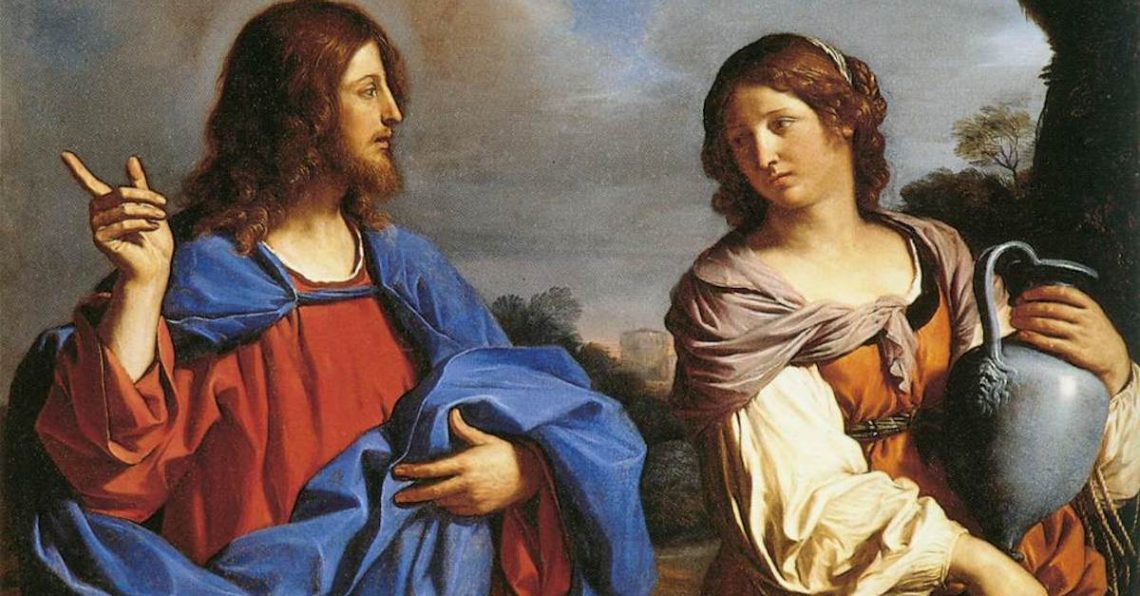
Sunday March 15, 2020 Third in Lent – Year A
South Bay UC and Picton United Church
Rev. Phil Hobbs, Minister (Retired Supply)
Bible Readings: Exodus 7.1-7; Gospel of John 4.5-42; Psalm 95 VU#814 Part One
HYMNS
MV#12 vs.1,2,3 (Introit)
VU#633 “Bless Now O God the Journey”
VU#626 “I Heard the Voice of Jesus Say”
VU#649 “Walk With Me”
VU#651 “Guide Me O Thou Great Jehovah”
Sung Response: MV#173 vs. 1,2,5 “Put Peace into Each Other’s Hands”
UNPACKING
Prayer: May the words of my mouth and the meditations of all our hearts be acceptable in your sight, O God, our Rock and our Redeemer. Amen.
When I was a student at the Vancouver School of Theology, I had as one of my professors, Rev. Dr. Elly Bradley. When some student would wax eloquent on a topic of theology, perhaps thinking to impress, Elly would often invite them to “unpack that for us”.
There are some Bible stories that need to be unpacked. Before we can understand the story, we have to have the context. Before we can understand what the story may or may not have to say to us – here in this 21st century – we need to understand what it would have said to those who first read it – and what it meant for those who were experiencing the events described in the story.
The story of Jesus encounter with the Samaritan woman – the story we’ve come to know as “The Woman at the Well” – is one such story.
If we read this story as though it occurred just down the street from here on a Monday noon near South Bay – just down Main St. in the heart of our town – then we will miss so much. The society in which Jesus lived and taught was very different from our own.
Jesus, a Palestinian Jewish Rabbi of the first century, would never have been expected to speak to a woman, who was not part of his family, in public, or even to acknowledge her existence. This was especially true because this woman was a Samaritan. The Samaritans were outside the acceptable mainstream of the community in which Jesus’ lived and moved. Their ancestors, descended from Abraham and Sarah, had been among those who remained in Judah, following the Babylonian exile. We catch a bit of the animosity in the story this morning.
The woman responds to Jesus’ request for a drink, with astonishment. She knew that a Rabbi would not normally speak to her. She was also aware that for a Rabbi, an observant Jew, to take a drink of water from her, was a violation of the holiness code. Late in the story, when the disciples return from shopping for lunch, they were astounded to find Jesus talking with a woman – and a woman of Samaria!
What we miss is in the details. This woman was alone at the well. The other women of her community would have come to the well early in the morning – to draw water needed for their household for the day. The women would have come together and there would have been much socializing, laughter, sharing of news and events. The fact that this woman was alone meant that she was a social outcaste even within her own Samaritan village.
We learn something of the reason for this in the conversation between the woman and Jesus. We learn that she has had five husbands, and the man she is currently with is not her husband.
Reading this story in 2020, we might think that this was a woman like some of the great Hollywood actors – such as the late Elizabeth Taylor – who was married a total of seven times. Perhaps you recall the Herman’s Hermits hit from 1965: “I’m ‘Enery the 8th I Am”.
If we were to think of this woman as similar to one with multiple marriages in the 21st century – we would be very mistaken. Her situation was vastly different.
This woman had no rights. She received her value only from her connection with a man – either her father, or a brother, or her husband. This woman had been used, abused and discarded by five men, and now was with a sixth man who did not even bother to give her the dignity of marrying her. At any time, she was likely to be thrown out again.
Reading the story without the knowledge of context might make it seem that Jesus is scolding or berating the woman – blaming her – maybe even suggesting that she is promiscuous when he points out that she had five husbands. Understanding the context, it is much more likely that Jesus is empathizing with her, acknowledging that this anonymous woman has been victimized and abused.
Jesus’ empathy for the woman makes it easier to understand that he commissions her as the first evangelist! The first witness! Jesus sends her back into the community to announce the presence of the Messiah.
Again, Jesus’ action in doing so is radical. In that society the word of a woman was not considered reliable. A woman could not be a witness in court. At the end of the story this is underlined in the reaction of the town’s people who became believers. They made a point of saying that they believed because they had seen for themselves, and not because of the woman’s testimony – lest their faith in Jesus be considered illegitimate.
As in his relationship with children, Jesus’ relationship with women affirmed their value as persons in their own right – as children of God. Tis was a radical departure from the norms of his society. As Marcus Borg points out in writing about Jesus – Jesus was determined to replace the holiness code of his day with a code of compassion. This code of compassion was in the tradition of the Hebrew Prophets, Isaiah, Jeremiah, and others. It was Jesus’ radical departure from the norms of his world that ultimately led to his arrest, trail and execution.
Jesus did not judge this poor woman but rather accepted her, acknowledged the pain of her social situation, and invited her to receive the cool clear water of God’s love. Jesus, as he often did, used metaphors from the ordinary experience of life. Since this woman had come to draw water, Jesus spoke of Living Water.
Again, we lose something of the power of this metaphor as we sit here on the shore of the inland sea called Lake Ontario – here in a country that has a significant portion of the world’s fresh water. Some might say that we don’t really know what it is to be without water, in the same way that these folk in our gospel story knew – living as they did in a land that is surrounded by barren wilderness of rock – lacking any water.
Still, all of us do have the experience of knowing thirst. And here in PE County, we are aware that there are many people who are dependant on wells for their water supply. In years of drought, the wells can run dry. In such circumstances we are grateful for the water truck that can bring hundreds of gallons with a simple phone call.
Both of the stories that we read from the Bible this morning have to do with refreshment for the journey.
The people of Israel were journeying from slavery in Egypt to their promised land. They were confronted with many hardships – not the least of which was inadequate water. They were faced with the likelihood of death from thirst. Of course, they grumbled against Moses – their leader. Moses struck the rock and water poured out for the people to satisfy their thirst and that of their animals.
During this Lenten Season we have opportunity to pay attention daily to our need for the Living Water that Jesus promises. We have opportunity to learn anew that we can’t do it all on our own – that God does not expect us to single handedly save the world. Jesus calls us to make a difference for good in the world as we are able, and promises to stand by us and walk with us as we follow him in the way of compassion. Jesus promises to provide for us living water. But in order to receive the gift of water we need to put down our baggage – to pause – to take time to be renewed and refreshed.
The replenishment of our spiritual wells does not happen by accident. There is much in our world that can drain our energies and cause our wells to dry up. We need to pay attention every day to the Source of Living Water. Jesus promises that there will be within us a spring of living water – “bubbling up to Life eternal”.
We can find ourselves this morning in the story of this woman at the well. Jesus doesn’t judge us. Jesus knows us and accepts us as we are. Jesus invites us to receive the Living Water – to receive refreshment for the journey.
Thanks be to God for the priceless gift of grace.
Amen.









